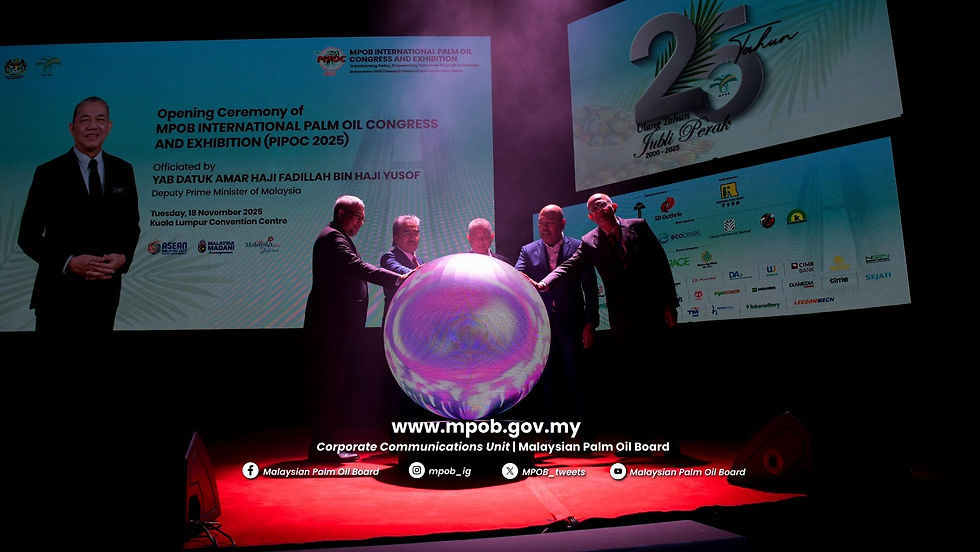The Launching of Global Framework Principles of Sustainable Palm Oil
- Feb 16, 2022
- 3 min read

CPOPC has developed and launched the Global Framework Principles of Sustainable Palm Oil (GFP-SPO) aims to be a common language across the different certification schemes being applied to palm oil production anchored in the UN SDGs as its base. The framework can also be used to value the contribution of palm oil toward achieving sustainable development in all producing countries and shall lay the foundations for the establishment of a sustainability of vegetable oils platform. The GFP-SPO was officially launched today on the webinar titled “Global Framework for Sustainable Palm Oil” attended by the representatives of CPOPC member and observer countries as well as other related stakeholders in palm oil sustainability schemes. The important document was adopted and approved by Ministers of member countries at the 9th Ministerial Meeting on 4 December 2021.
CPOPC’s Executive Director, Tan Sri Dr. Yusof Basiron, asserted palm oil’s contribution to the SDGs, “CPOPC believes that palm oil is a sustainable alternative to other vegetable oils such as soybean, rapeseed and sunflower across all the three SDG focus areas which are; social, economic, and environmental. Therefore, the GFP will be used as a reference because its principles will draw and expand upon the current sustainable palm oil certification schemes such the Indonesia Sustainable Palm Oil or ISPO for Indonesia, and Malaysia Sustainable Palm Oil or MSPO for Malaysia, and provide guidance to future ones.”.
Deputy Minister for Food and Agribusiness, Coordinating Ministry for Economic Affairs, the Republic of Indonesia, Dr. Musdhalifah Machmud, emphasized that, “In collaboration and support of the current certification schemes, the GFP-SPO can provide a common language across systems and benchmarks. It is worth noting that this framework is voluntary and is not intended to be a new palm oil certification scheme but rather a critical reference applicable to the existing and future schemes.”.
Secretary General, Ministry of Plantation Industries and Commodities of Malaysia, YBhg. Datuk Ravi Muthayah, stated that,” GFP-SPO is important in ensuring that palm oils are able to meet the world demand in a sustainable and productive way by adhering the SDG principles. The principles are global in nature and universally applicable, taking into account different national realities and levels of development.”
While presenting an overview of the global demand of palm oil and the global framework, Sustainability Consultant, Mr. Ziv Ragowsky reaffirmed that GFP-SPO is a platform of collaboration among the producers of vegetable oils, “The idea of having the framework is to have a discussion of palm oil producing countries with other stakeholders and the United Nations and to have a positive discourse that avoids a lot of difficulties and frictions of pinning one stakeholder against one another.”
Coordinator Team Indonesian Sustainable Palm Oil (ISPO) Secretariat, Dr. Herdradjat Natawidjaja, connected the GFP-SPO and ISPO through ISPO’s supports towards the implementation of the GFP-SPO that has been set by CPOPC to cover the 7 Principles towards achieving the global SDGs goals. The seven principles mentioned here are compliance with regulations, implementation of good agricultural practices, management of the environment, natural resources and biodiversity, responsibility to workers, social responsibility and community economic empowerment, application of transparency and sustainable business improvement.
Senior Manager of System Management Department, Malaysian Palm Oil Certification Council (MPOCC), Mr. Simon Selvaraj shared that the GFP is useful in coordinating CPOPC’s member countries, Indonesia and Malaysia sustainability efforts in economic, environment and social aspects. This framework has elevated the bar in sustainability requirement because it is able to holistically measure the UN SDG goals. Mr. Selvaraj added that the GFP-SPO shall play the wider role in addressing sustainability issues with early adoption which will significantly help everyone in the supply chain.
The Deputy Executive Director of CPOPC, Mr. Dupito Simamora concluded the webinar by affirming the continued efforts of palm oil producing countries to attain a sustainable supply chain, “Palm oil has led by examples to continuously improve the sustainability framework which should also be emulated by producers of other vegetable oils. The international support would be required from other palm oil producing countries, relevant organizations as well as the UN bodies for the framework to be extrapolated to all oils".
Today’s webinar on the Global Framework Principles of Sustainable Palm Oil (GFP-SPO) is the first session of the 2-series webinar aimed to introduce the framework to the public. It was moderated by CPOPC’s Director of Sustainability and Development of Smallholders, Mr. Witjaksana Darmosarkoro and attended by government representatives from Indonesia, Malaysia, Colombia, Thailand, Ghana, Honduras, the Philippines, Sierra Leone, and Papua New Guinea and the private sector. The next webinar in March 2022, representatives from the relevant United Nations bodies, sustainability organizations, producers of other vegetable oils and stakeholders will be invited to speak and attend.









